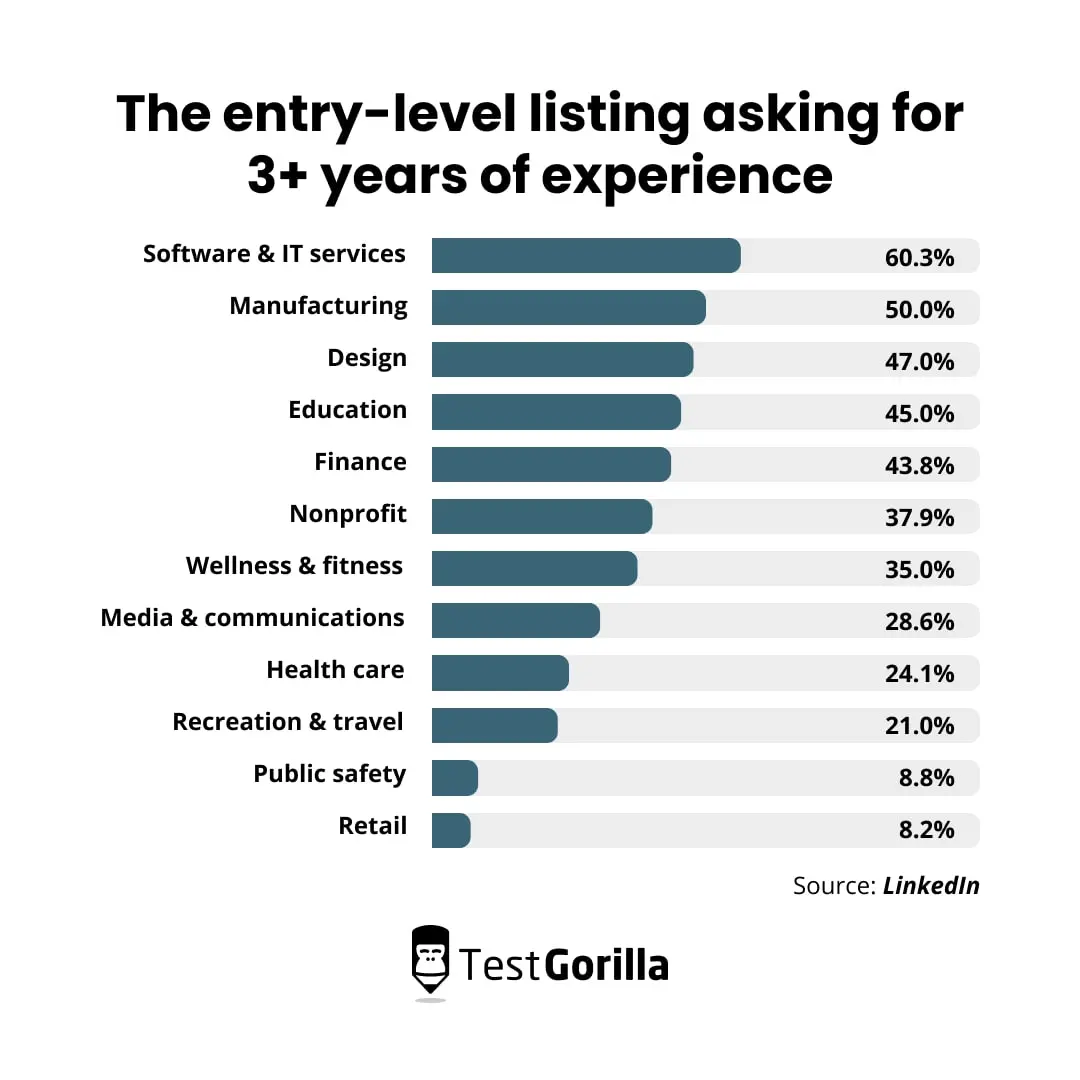For job seekers and HR professionals alike, an important question arises during the hiring process – “am I (or are they) qualified for this position?”
Normally, the answer isn’t straightforward when “qualified” is such a tough metric to nail down. The bar is different for each position and can be subjective if you’re relying on past experience or job descriptions on a resume.
To simplify things, many employers look to a candidate’s years of work experience in a role or industry to determine if they are a suitable hire.
To do that, however, assumes that the passage of time translates into professional excellence – that more years are better than fewer, and that experiences unrelated to the job at hand are relatively worthless.
But is that really the case?
If years of experience aren’t the perfect substitute for competence, what else should candidates and employers focus on?
At TestGorilla, we’re convinced we have a much better answer (spoiler: It’s skills-based job assessments!), but before we get to that, let’s explore why years of experience was traditionally a focal point for hiring and why it sometimes tells the wrong story.
Table of contents
- What do we mean by years of experience?
- Why did years of experience become an important proxy for skills?
- Is listing years of experience as a requirement in a job description a good idea?
- The alternative: Focus on candidates’ skills and competencies with a skills-based hiring approach
- The benefits of skills-based hiring over traditional experience-based methods
- Drop years of experience for skills instead
- Sources
What do we mean by years of experience?
“Years of experience” refers to the amount of time a candidate has worked in a particular field or industry.
Occasionally, “equivalent experience” is also used to refer to things like freelance work, internships, or volunteer time.
When a job posting lists years of experience as a requirement, an employer is indicating they’re looking for candidates who meet a certain level of specific professional experience.
Similarly, when candidates list years of experience on their resume, they are providing potential employers with an idea of how long they have worked in a given career or role.
Traditionally, this information has helped employers assess an applicant’s degree of expertise and gauge their ability to execute.
As a job requirement, years of experience can be presented in different ways – sometimes applied generally to all work experiences, or sometimes relative to a field of business like accounting or software engineering.
Example job posting industry | How years of experience is expressed |
Retail Management | “3+ years of specialty retail experience” |
Finance | “Experience: Ten years of progressive financial oversight experience in a complex healthcare organization is required.” |
Marketing | “8+ years of agency and/or in-house creative team experience.” |
Consulting | “You have 5+ years of experience in a role that requires analytical problem solving, operational rigor, and outcome ownership.” |
Ultimately, it’s up to each employer to define what qualifies as relevant experience in determining an applicant’s talent.
Why did years of experience become an important proxy for skills?
If it takes candidates hundreds of applications to get a job interview for an open position, it also means recruiters are drowning in resumes and cover letters.
To cope with the volume of job applications, employers often list requirements that quickly qualify or disqualify a candidate in the job search.
As a way to screen for quality, years of experience became a quick proxy.
Internally, it helped employers judge an applicant’s potential fit. Externally, it indicated to job seekers the level of position an employer desired, similar to how “manager” or “director” in a job title might clarify seniority.
Surprisingly, even for entry-level roles, years of experience is now commonplace. A recent LinkedIn study found that up to 60% of entry-level listings require 3 or more years of experience.[1]
Which begs a fair question, how are candidates meant to acquire experience in a field they are just entering?
What employers really want to know is whether they are hiring a talented employee who can excel at their job responsibilities and won’t be a mis-hire that costs the company time, money, or reputation.
That’s why many human resource organizations are dropping years of experience entirely, realizing it may not be the best way to attract and qualify top talent.
Is listing years of experience as a requirement in a job description a good idea?
Some hiring managers may view listing experience requirements in a job posting as a relatively inconsequential decision. The thought process might be – “this will help applicants self-select without limiting the talent pool.”
We have to disagree and tend to see more pernicious downsides in limiting candidates by their work history.
Let’s take a look at seven potential problems that stem from emphasizing experience as defined by years:
In many cases, job requirements get inflated over time as hiring managers seek to clone the departing employee. Requiring applicants to possess the same experience and skills that the previous person acquired over their time at your company can be an unnecessary expectation.
Everyone starts out as “unqualified” in some sense. Even a candidate with direct experience at your closest competitor is unlikely to know the internal processes, stakeholders, or operating style of your company.
Requiring multiple years of experience in an entry-level job description puts a bad taste in candidates’ mouths. As a LinkedIn post with more than 50,000 reactions put it: “Having that expectation from the start is extremely discouraging for college students and budding professionals…”
Setting the experience bar too high can restrict your talent pool and prevent younger talent from applying. Gen Z holds many of the most skill-savvy, talented individuals that the job market has to offer. However, they often earn these traits through high school and college or personal interests – something that doesn’t translate well in resumes.
Narrowly defining what qualifies as experience can unintentionally force employers to focus on candidates who have taken “safe” career paths. It’s possible that the employee who has held multiple jobs in a similar industry is much more effective than the employee who has stayed in the same role. Perhaps that multipotentialite with a winding path is your next CEO!
Time isn’t the only way candidates pick up experience. Thanks to the internet and alternative schooling or job readiness programs, employees can gain experience through non-traditional avenues like boot camps, continued education, professional certifications, or passion projects.
Years of experience is unintentionally biased against minorities and other disadvantaged applicants. For example, one study showed that women apply to 20% fewer jobs than men and generally only do so when they feel 100% confident they are qualified, so requiring a high number of years narrows female applicants disproportionately.[2]
If years of experience is a bad shortcut to qualifying talent that damages your candidate pool, what’s a better alternative?
The answer is to screen for proficiency directly by objectively assessing skills and capabilities.
The alternative: Focus on candidates’ skills and competencies with a skills-based hiring approach
Rather than estimating the quality of a candidate by looking at their years of experience in an industry or role, employers can directly assess competencies with a skills-based hiring approach.
Skills-based hiring methods enable employers to fill open roles based on quantifiable skills using unbiased assessments and structured interviews.
This helps organizations find talent that is best suited for each role and leads to lower costs, faster hires, and more engaged employees.
In fact, in our State of Skills-Based Hiring Report, employers that used hired based on skills saw:
89% reduction in cost-to-hire
91% reduction in time-to-hire
92% reduction in mis-hires
91% increase in retention
To follow a skills-based approach, instead of listing years of experience as a job requirement, employers can list the level of proficiency desired in specific skill sets.
This gives applicants greater insight into whether they are qualified or not and gives employers objective elements to screen against.
Ultimately, the length or type of experience doesn’t indicate whether an employee can execute effectively in a role; it’s their ability and willingness to contribute that does.
Let’s explore in more detail some of the benefits of qualifying candidates using skills vs. experience.
The benefits of skills-based hiring over traditional experience-based methods
Unfortunately, experience-based methods of hiring that rely heavily on resumes and conversations with candidates simply don’t work.
Past experience doesn’t necessarily translate into job success, and employers intuitively know this (even if they haven’t adopted a skills-based approach themselves).
We routinely survey companies of all types and find remarkable agreement – a majority of employers admit that resume experience doesn’t tell them if an applicant has the necessary skills for the job.
Instead, skills-based hiring methods present a better alternative that correlates candidate performance to job requirements.
8 reasons skills beat years of experience any day
To bring our point to life, let’s consider a number of reasons skills-based hiring methods win out over experience-based methods.
Benefits to skills-based hiring | What this means in practice |
1. Rewards non-traditional experience | Captures candidates who are skilled through alternative routes ( ) |
2. Reduces bias and improves diversity | Prevents bias from creeping into the hiring and qualification process |
3. Opens up a wider talent pool | Doesn’t artificially limit the pool of applicants and enables employers to find that diamond in the rough |
4. Accurately assesses personality and working styles | Gives employers insight into applicant’s soft skills |
5. Reduces the time and cost to hire | Makes hiring objective and comparable for hiring managers |
6. Reinforces the importance of training and development | Emphasizes the role skills play in a highly effective organization |
7. Improves retention and limits mis-hires | Ensures employees are perfectly aligned for the company and position they are joining |
8. Sources potential over past performance | Uncovers candidates with less direct experience but great potential to learn and grow |
1. Rewards non-traditional experience
One problem with experience-based hiring methods is they tend to overlook experience that doesn’t fit neatly into a “job.”
A corporate 9-to-5 job is one way to pick up valuable skills, but there are many others…
Non-traditional avenues of experience | How this translates to valuable skills |
Extracurricular activities | A candidate runs their student organization and gains |
Passion projects | A candidate builds a mobile app on their own and picks up |
Side hustles | A candidate helps cold-call for his mom’s business and picks up |
Hobbies | A candidate creates logos in their spare time and gains |
A skills-based hiring approach recognizes and values all of these relevant skill sets, but an experience-based approach likely doesn’t.
As long as a candidate demonstrates they possess the capabilities needed to succeed in a given role, years of experience shouldn’t matter.
2. Reduces bias and improves diversity
Traditional hiring methods often enable unconscious bias to creep into the process based on factors such as gender, ethnicity, and age.
Skills-based hiring, on the other hand, evaluates candidates based on their skills and abilities, reducing the impact of bias in the hiring process.
This alone helps companies improve the diversity of new hires.
Skills-based hiring also de-emphasizes the importance of “brand name” schools and companies on a resume which enables employers to consider more diverse talent.
That way employers can hire and promote employees based on their output and impact rather than their historical experience.
3. Opens up a wider talent pool
Skills-based hiring expands the talent pool beyond applicants who have followed a given career path or who possess a certain level of formal education.
This approach enables companies to identify and attract candidates who have the specific skills needed for the job, regardless of their background or education.
In contrast, experience-based hiring methods restrict the talent pool by:
Including unnecessary job requirements (such as years of experience)
Discouraging applicants who have switched careers from applying
Eliminating fantastic talent that happens to have a criminal record
Skills-based hiring keeps the net as wide as possible and then efficiently filters candidates through objective assessments to test their likelihood of success.
4. Accurately assesses personality and working styles
A company’s culture is often a thing of pride for leading organizations.
This makes sense in relation to the hiring process because 77% of employees consider a company’s culture before applying.
Applicants want to know if their personality and approach to work gel with the company’s expectations.
And employers have a vested interest, too, because good cultural additions raise the organization’s reputation and build internal collaboration.
Years of experience tells employers little about an applicant’s soft skills, but a common misconception is that skills-based hiring methods also fail to do so.
In reality, there are many research-backed assessments designed to give employers deep insights into a candidate’s personality, motivation, and more.
5. Reduces the time and cost to hire
Traditional hiring methods often require a lengthy and expensive process of sifting through resumes, conducting interviews, and checking references.
Current employees take valuable time out of their day to interview applicants in a haphazard way because hiring managers struggle to make sense of varying and unorganized feedback.
The problem with assessing talent based on experience and conversation is that it is entirely subjective. And HR is left juggling conflicting interview notes and internal disagreements about who to hire.
Instead, skills assessment software, like those offered by TestGorilla, give employers expertly crafted tests that efficiently and objectively qualify candidates, saving HR time and money.
6. Reinforces the importance of training and development
When employers rely on years of experience, it’s easy to assume that an experienced hire walks in with all of the necessary skills and attributes to succeed on the job.
This however is rarely the case.
If employers really want their employees to succeed, it’s not enough to assume that past experience has given them everything they will ever need.
Instead, companies should design professional development plans to help individuals grow their skills and contribute more effectively.
Skills-first organizations innately emphasize the importance of training and development, so the focus is on candidates’ skills and abilities rather than their existing experience.
This approach encourages companies to invest in training, leading to a more skilled and adaptable workforce.
7. Improves retention and limits mis-hires
Skills-based hiring methods more effectively align applicants with job requirements leading to a better experience for both the candidate and the company.
Hiring an employee underqualified for a role or simply doesn’t understand what is required of them daily quickly leads to turnover.
Skills assessments solve this problem by testing capabilities directly and giving applicants a taste of what the job entails.
This results in higher retention rates because employees join knowing they are a good fit for the job and the company culture. They are, therefore, more likely to stay with the company long-term.
Experience-based hiring methods, on the other hand, result in mis-hires when there is a poor match between the employee’s traits and skills and the job requirements.
8. Sources potential over past performance
While experience-based hiring methods elevate candidates who have done the exact job in question, skills-based practices unearth candidates who might not have direct experience but do have great potential.
Hiring for potential not only gives unusual applicants a fair chance but also leads to business benefits:
Candidates with potential vs. experience are generally less tenured and less in demand, meaning they are cheaper and easier to acquire.
Candidates with potential are adaptable and can grow into senior roles or take on additional responsibilities over time.
Candidates with potential encourage internal mobility in a company because these workers are capable of moving into new positions.
In these ways, skills-based hiring methods provide employers with versatile and surprising talent.
Drop years of experience for skills instead
The right distinction when qualifying candidates is not years of experience; it’s “type and level of skills.”
While job requirements like years of experience made sense in the past when career paths were linear and long, today it hamstrings employers in a world where skills can be attained through alternative routes.
Instead of relying on experience as a proxy for talent, companies should open up their talent pool and prioritize hiring for the right skills directly.
From our experience working with organizations around the world, we’ve seen the power skills-based hiring methods have to build diverse, cohesive, and agile workforces.
So the next time you’re looking to find a killer finance manager (or hundreds of other roles we have tests for), use our skills assessment software to find a leader equipped to meet the challenges of the future.
Sources
Anders, George. (August 18, 2021). “Hiring’s new red line: why newcomers can’t land 35% of ‘entry-level’ jobs”. LinkedIn. Retrieved May 31, 2023. https://www.linkedin.com/pulse/hirings-new-red-line-why-newcomers-cant-land-35-jobs-george-anders/
Ignatova, Maria. (March 5, 2019). “New Report: Women Apply to Fewer Jobs Than Men, But Are More Likely to Get Hired”. LinkedIn. Retrieved May 31, 2023. https://www.linkedin.com/business/talent/blog/talent-acquisition/how-women-find-jobs-gender-report/
Related posts
Hire the best candidates with TestGorilla
Create pre-employment assessments in minutes to screen candidates, save time, and hire the best talent.
Latest posts
The best advice in pre-employment testing, in your inbox.
No spam. Unsubscribe at any time.

Hire the best. No bias. No stress.
Our screening tests identify the best candidates and make your hiring decisions faster, easier, and bias-free.
Free resources
This checklist covers key features you should look for when choosing a skills testing platform
This resource will help you develop an onboarding checklist for new hires.
How to assess your candidates' attention to detail.
Learn how to get human resources certified through HRCI or SHRM.
Learn how you can improve the level of talent at your company.
Learn how CapitalT reduced hiring bias with online skills assessments.
Learn how to make the resume process more efficient and more effective.
Improve your hiring strategy with these 7 critical recruitment metrics.
Learn how Sukhi decreased time spent reviewing resumes by 83%!
Hire more efficiently with these hacks that 99% of recruiters aren't using.
Make a business case for diversity and inclusion initiatives with this data.


















